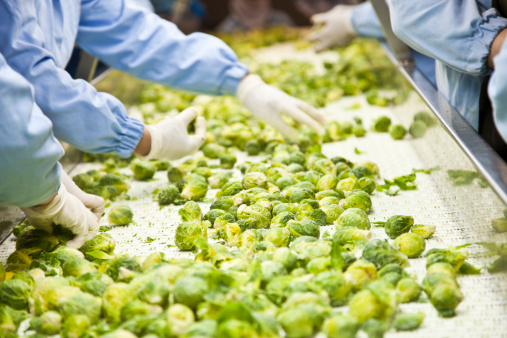
A recently introduced bill would create a new, unified agency to oversee all U.S. food safety.
Each year 3,000 Americans die from foodborne illness, a tragedy many blame on an outdated, fragmented food safety regulatory system. Currently, a variety of separate agencies regulate food safety in the United States, with no single agency or administrator having general oversight.
In an effort to strengthen the nation’s oversight of food safety, Senator Richard Durbin and Representative Rosa DeLauro recently introduced the Safe Food Act of 2015, proposing to create a new, centralized Food Safety Administration that would assume overall responsibility for ensuring the American food supply is safe.
Durbin and DeLauro argue that the lack of coordinated regulation and ultimate authority on food safety is a pressing national security concern. To illustrate the currently fragmented oversight, they track the regulation of a single egg. Before an egg arrives at the local grocery store, five different agencies or services are involved in separately regulating the hen, the hen’s feed, salmonella risk, whole eggs, and processed eggs, respectively. The Centers for Disease Control and Prevention estimates that, according to the most current data, each year 48 million Americans contract foodborne illness, resulting in 128,000 hospitalizations.
The involvement of multiple agencies in regulating a single food product can create confusingly mismatched guidelines as well as gaps where no agency provides oversight. Additionally, fragmented regulation slows down implementation of important food safety developments by public health experts, as no single agency has ultimate control. As the food industry becomes more complex and global, this multi-agency system inadequately protects American consumers, Durbin and DeLauro maintain.
By creating a single Food Safety Administration, the proposed Safe Food Act would build on the initiatives found in the FDA Food Safety Modernization Act of 2010, which modernized the food safety system by shifting focus from response to prevention. Moreover, the proposed bill responds to the lack of coordination on food safety, which led the U.S. Government Accountability Office to recommend that the agencies better communicate to develop a coordinated food safety plan.
The Safe Food Act would consolidate into a single new agency all of the food safety functions currently performed by the National Oceanic and Atmospheric Administration and multiple different services of the U.S. Food and Drug Administration and the U.S. Department of Agriculture. An “Administrator of Food Safety,” appointed by the President and confirmed by the Senate, would lead the proposed new agency. The proposed Food Safety Administration would “administer a national food safety program… to protect public health” and ensure participants at all stages of the food industry eliminate or at least mitigate food safety risks. To accomplish these goals, the agency would, among other things, sample and test food products made in the United States as well as imported food products, implement a national surveillance system, develop public outreach programs, mandate traceability of food sources, and fund research to enhance food safety.
Durbin and DeLauro’s bill would use requirements currently in place while authorizing the proposed agency to issue new regulations. For example, the proposed Food Safety Administration would be charged with creating and managing a registration system for all facilities in the United States which handle food products or which import food products into the United States. The agency would also be expected to create a more extensive food inspection program, establishing regular examination of facilities, depending on the facility’s classification and history, to ensure safety and compliance with all regulations. Finally, the agency would have the authority to issue recalls of contaminated foods and to instigate enforcement actions against any facility violating the requirements.
Durbin and DeLauro hope to garner bipartisan support for the Safe Food Act of 2015. Supporters of the bill argue that it should receive bipartisan support because it would increase food safety for consumers, while also providing greater efficiency by eliminating significant unnecessary expenditures that result from multiple agencies with limited general oversight currently sharing responsibility for food safety regulation. When combined with a greater ability to coordinate research, a single agency could save money in the long run. The bill’s sponsors, however, did not give an estimated up front cost for establishing a new agency and consolidating functions.
Supporters also argue that a single agency would increase transparency. Consolidating all food safety regulation would make it easier for participants in the food industry to navigate and for public health officials to evaluate various regulatory requirements.
President Barack Obama included variations of the proposed Safe Food Act in his 2016 budget proposal. However, instead of creating a separate new food safety agency, the budget proposes consolidating all food safety regulation under a single agency within the Department of Health and Human Services (HHS). Although sponsors of the proposed Safe Food Act would like to see a new, separate agency, Durbin and DeLauro have given their support to the President’s proposal to consolidate under the HHS as a step in the right direction.
On the other hand, the Consumer Federation of America, a non-profit consumer interest advocacy group, has criticized the President’s proposal to create an agency under the HHS, arguing that “a new food safety agency would be lost among the other priorities of the Department, and would likely not receive the recognition or resources necessary for it to be effective.” Instead, the consumer group continues to support the Durbin-DeLauro Safe Food Act of 2015 and advocates for the creation of a new agency.
To date, all co-sponsors of the proposed Safe Food Act in the Senate and House of Representatives are Democrats. It is yet unclear whether the proposal will garner sufficient support to pass Congress, particularly as it resembles five bills which Durbin and DeLauro unsuccessfully introduced previously.



